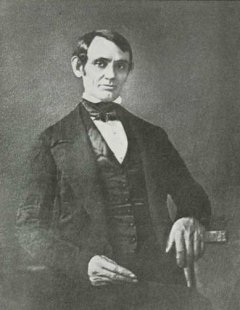
Draw two circles with three tangents as shown.
AB will always equal CD.

Draw two circles with three tangents as shown.
AB will always equal CD.
In the 34th Volume of the Memoirs of the Royal Academy of Sciences of Turin (1830) Dr. Speranza of Parma relates the case of an individual whose left fore arm emitted an odor of Amber, or of Benzoin, or Balsam of Peru. The odoriferous emanations were sometimes so strong that they filled the whole of the large room in which the Doctor conducted his experiments upon this personage, whom he suspected at first of some charlatanry, but of whose sincerity he was soon convinced. He was a man of thirty four years of age, of a robust constitution, (having, until that time enjoyed constant health) agreeable eyes, expressive features, dark thick hair, a ruddy countenance, muscles prominent,–a man of ardent feelings and quick penetration; to whom nature had been liberal in her endowments. It did not appear that electricity had any part in the production of this singular phenomenon. An attack of bilious fever, in the course of two months, destroyed the cause, and the effect did not return after his recovery.
— American Journal of Science, August 1832

During the Black Hawk War, Abe Lincoln was leading 20 men through a field when he saw they’d need to pass through a narrow gate.
“I could not, for the life of me, remember the proper word of command for getting my company endwise, so that it could pass through the gate,” he later recalled.
“So, as we came near, I shouted, ‘Halt! this company is dismissed for two minutes, when it will fall in again on the other side of the gate.'”
A psychologist at a girl’s college asked the members of his class to compliment any girl wearing red. Within a week the cafeteria was a blaze of red. None of the girls were aware of being influenced, although they did notice that the atmosphere was more friendly. A class at the University of Minnesota is reported to have conditioned their psychology professor a week after he told them about learning without awareness. Every time he moved toward the right side of the room, they paid more attention and laughed more uproariously at his jokes, until apparently they were able to condition him right out the door.
— W. Lambert Gardiner, Psychology: A Story of a Search, 1970
Christopher Morley named his cats Shall and Will, “because nobody can tell them apart.”

In 1953 George F. Jorgenson invented a paddle with a breakaway handle, for use by overzealous disciplinarians.
“A primary object of this invention is to provide a paddle for use in disciplining a child, the paddle having means for preventing accidental injury to the child by striking too hard a blow.”
Ten years later, Ashley Pond did the same thing for angry golfers.
Life is a jest; and all things show it.
I thought so once; and now I know it.
— Matthew Prior’s epitaph
Ah! Matt.: old age has brought to me
Thy wisdom, less thy certainty:
The world’s a jest, and joy’s a trinket:
I knew that once: but now–I think it.
— James K. Stephen, “Senex to Matt. Prior”
I hold it true, whate’er befall;
I feel it when I sorrow most;
‘Tis better to have loved and lost
Than never to have loved at all.
— Tennyson, “In Memoriam A.H.H.”
I feel it when the game is done,
I feel it when I suffer most.
‘Tis better to have loved and lost
Than ever to have loved and won.
— Gerald Bullett, “Footnote to Tennyson”
Suppose that Smith and Jones have applied for a certain job. And suppose that Smith has strong evidence for the following conjunctive proposition:
(d) Jones is the man who will get the job, and Jones has ten coins in his pocket.
Smith’s evidence for (d) might be that the president of the company assured him that Jones would in the end be selected, and that he, Smith, had counted the coins in Jones’s pocket ten minutes ago. Proposition (d) entails:
(e) The man who will get the job has ten coins in his pocket.
Let us suppose that Smith sees the entailment from (d) to (e), and accepts (e) on the grounds of (d), for which he has strong evidence. In this case, Smith is clearly justified in believing that (e) is true.
But imagine, further, that unknown to Smith, he himself, not Jones, will get the job. And, also, unknown to Smith, he himself has ten coins in his pocket. Proposition (e) is then true, though proposition (d), from which Smith inferred (e), is false.
In our example, then, all of the following are true: (i) (e) is true, (ii) Smith believes that (e) is true, and (iii) Smith is justified in believing that (e) is true. But it is equally clear that Smith does not know that (e) is true; for (e) is true in virtue of the number of coins in Smith’s pocket, while Smith does not know how many coins are in Smith’s pocket, and bases his belief in (e) on a count of the coins in Jones’s pocket, whom he falsely believes to be the man who will get the job. [Does Smith know that the man who will get the job has ten coins in his pocket?]
— Edmund L. Gettier, “Is Justified True Belief Knowledge?”, Analysis, 1963

In August 1945, about 500 Manhattan Project alumni founded the Association of Los Alamos Scientists to educate the public about nuclear energy.
They stressed the first syllable of the acronym.
“The natural flights of the human mind are not from pleasure to pleasure, but from hope to hope.” — Samuel Johnson
“If it were not for hopes, the heart would break.” — Thomas Fuller
“Always leave something to wish for; otherwise you will be miserable from your very happiness.” — Baltasar Gracián